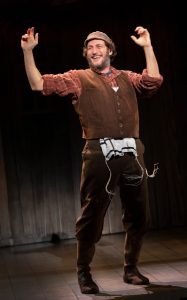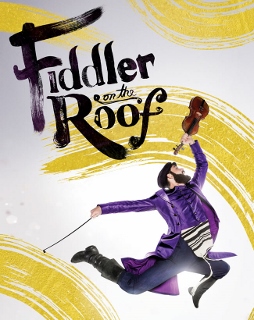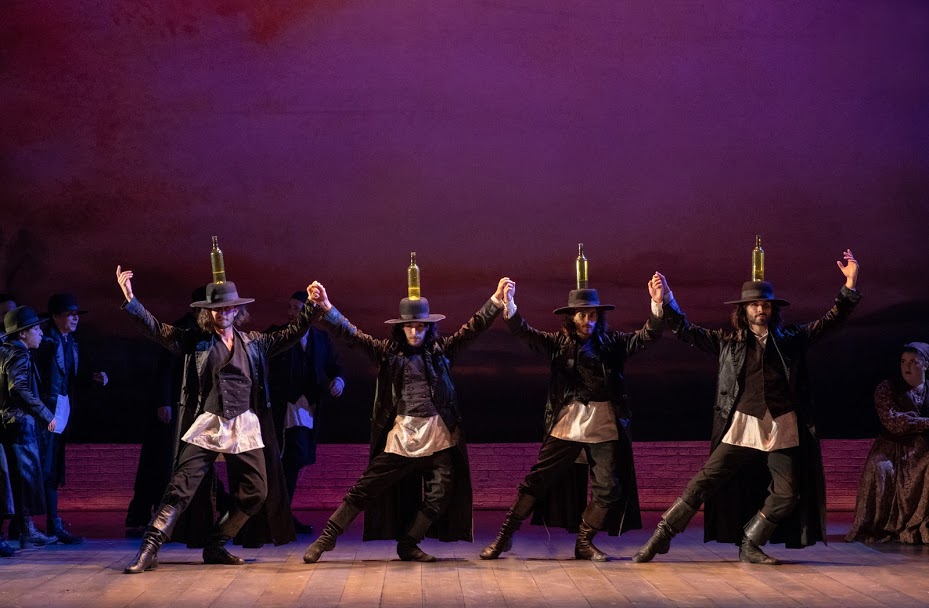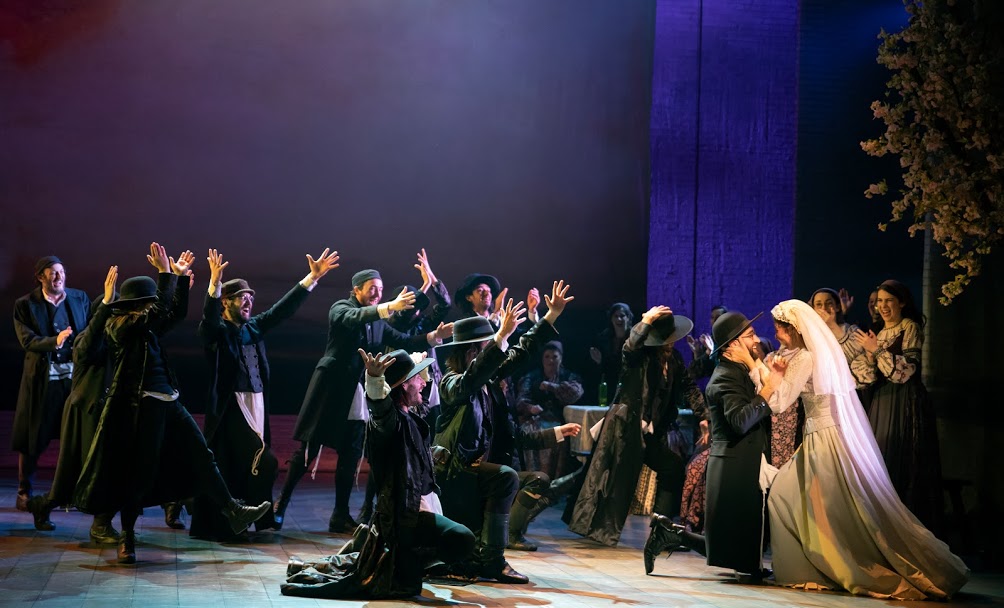AS RELEVANT AND CELEBRATORY AS EVER,
FIDDLER GETS A POWERFUL REVIVAL
It takes a musical to make a village: At nearly three hours, this very replete revival, which plays the Segerstrom Center in Costa Mesa through May 17, takes its time — but not ours. Fiddler on the Roof, the beloved 1964 musical, richly rewards every minute you spend 114 years before today.
But, then, what’s the hurry anyway? Life in the shtetl of Anatevka circa 1905 moved at a comparatively glacial pace, even as history clashes with tradition. The future arrives in little things — taboos broken, rumors spread, a sewing machine replacing hemming by hand — as much as in Czarist edicts. That’s why the plight of Sholom Aleichem’s dairy man Tevye becomes cumulatively devastating. His life, like his village, is indeed as precarious as a “fiddler on the roof.”
 Seen so completely from the inside out that we ache for every loss, this tiny town becomes one collective character, its eccentricities no greater than the contradictions within a single soul.
Seen so completely from the inside out that we ache for every loss, this tiny town becomes one collective character, its eccentricities no greater than the contradictions within a single soul.
With only God to confide in, this milkman/survivor contends with a lifetime of changes in just one year — pogroms and persecution and, at home, strong-willed daughters who marry for love, not security (or worse, outside the faith). Happily, Tevye’s faith-based strength is reflected in Jerry Bock and Sheldon Harnick’s bedrock ballads (“Sunrise, Sunset” is every note as wise as it is warm). Happily, unlike some portrayals of Tevye, ours neither gestures at what’s genuine nor milks his stand-up chats with the Deity: A comic craftsman — but never an unashamed ham — Yehezkel Lazarov gives his soberly twinkling Tevye a moral weight that balances the vaudeville banter with God and townsfolk.
It’s no surprise that this 1964 triumph — with an irresistible book by Joseph Stein — keeps surprising us with our own humanity. What stands out under Bartlett Sher’s faithfully orchestrated and totally trusted guidance isn’t just the wry folk wisdom of Tevye. It’s not even his comic confrontations with what threatens to become constant disruption. It’s the way the dances mark every important turning in the tale — and the songs come straight from the story, emotion so well-wrought it must be sung.
Tevye apart, it’s easy to forget how generous this show can be as we both discover a family through its town and glimpse what might have been. Whether it’s the carefree improvising that goes into Tevye’s covetous shenanigans in “If I Were a Rich Man” (which could easily be the national anthem of the majority who aren’t), the doleful processional that empties Anatevka forever, or the taboo-smashing couples who tentatively polka in “The Wedding Dance,” Jerome Robbins’ inspirational choreography, here recharged by Hofesh Schechter, charts a disappearing world in its seemingly eternal circles. These blasts from the past cover a ton of territory: five songs before violence disrupts the joyous wedding dance, Russian peasants and Jewish celebrants fuse the hora and kazachok (a lively, Slavic folk dance) in the exuberant “To Life.” The rites of passage are thrilling to watch, contagiously communal movements that chronicle a betrothal, a nightmare, a wedding, a village-wide Seder with its Sabbath prayers, and, finally, the settlement’s inevitable expulsion. These scenes play like Marc Chagall village fantasies come to life.
Charmingly conducted by Ted Sperling, the songs define the characters as indelibly as Aleichem did from the start. “Do You Love Me?” finally softens the gruff, practical soul of Tevye’s wife Golde, charmingly conjured by Maite Uzal’s flinty indomitability. The waltz “Matchmaker, Matchmaker,” sung by three sisters not unlike Chekhov’s trio, posits what might have been against what may be. The heartbreaking “Far from the Home I Love” has daughter Hodel (Ruthy Froch) demonstrating the inner turmoil of the Jewish exodus. Motel (Jesse Weil), a nebbishy but self-emancipating tailor who craves some long-delayed happiness, suddenly springs into joy with “Miracle of Miracles.” Likewise, Hodel’s socialist agitator and revolutionary, Perchik (Ryne Nardecchia), when he rejoices in “Now I Have Everything.”
Sher’s Tony Award-nominated production, presented on tour by the non-Equity organization NETworks, abounds in warmly crafted portrayals: Jonathan Von Mering as the bellicose butcher Lazar Wolf; Mel Weyn as Motel’s soul mate, Tzeitel, the eldest of Tevye’s five daughters; Carol Beaugard as the slippery serviceable matchmaker Yente; Joshua Logan Alexander as the comparatively decent Russian lad Fyedka, and Natalie Powers as his proto-feminist Chava, soon to break with everything.
The emotional final tableau has Anatevka’s diaspora depicted as silhouetted exiles circling together in a sort of wagon train until they break apart to destinations unknown. This circle of life — unbroken and broken at the same time — illustrates and embraces the urgency of immigrants hoping for a second chance.
In song, joke, and sorrow, Fiddler on the Roof is very much a nearly lost family album, seminal snapshots that stand for many more perished memories. Tradition indeed: You don’t fix what has never broken in over half a century. Fiddler on the Roof remains a powerful testament to a village united by habit as much as love, and destroyed by ignorance as much as bigotry.
photos by Joan Marcus
Fiddler on the Roof
national tour
tour continues through 2020
for dates and cities, visit Fiddler





{ 3 comments… read them below or add one }
This performance was perfect! Every voice, every line, every movement! Will remember it the rest of my life. Best one ever!
I didn’t see this musical until I had to review it for a drama class assignment. BEST MUSICAL EVER! The songs and the performances were amazing!
I agree with everything except the praise for the song “Now I Have Everything.” Its bouncy musical tempo was completely out of step with the show. There was no old world Jewish folklore flavor and the vapid infatuated school-girl lyrics were distractingly bad. Also we are asked to believe that the analytical political student Perchik, who one scene before could not propose without making it a hypothetical question, is suddenly prancing around the stage gleefully proclaiming his love. The new song “Rumor†was unnecessary and forgettable, but at least it blended with the show. I loved so much about this production but it is hard not to fixate on how this song made it past rehearsal and development.